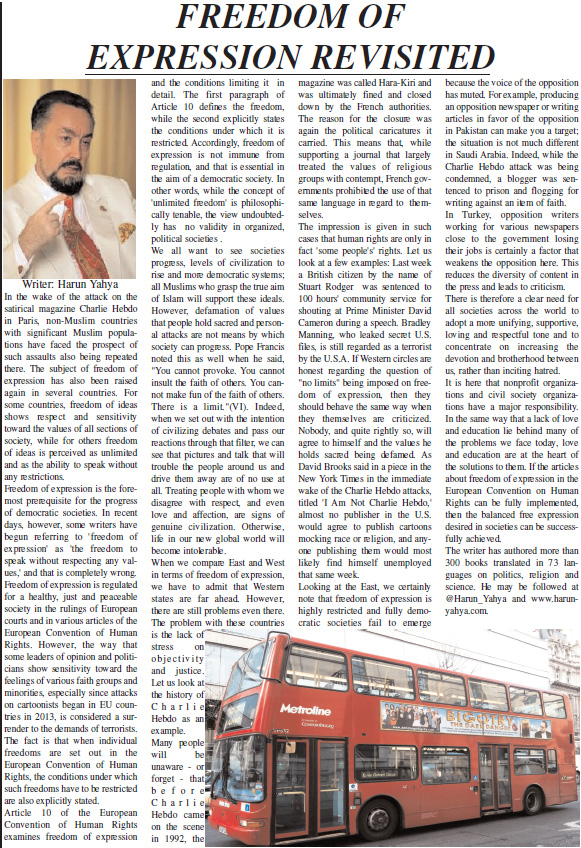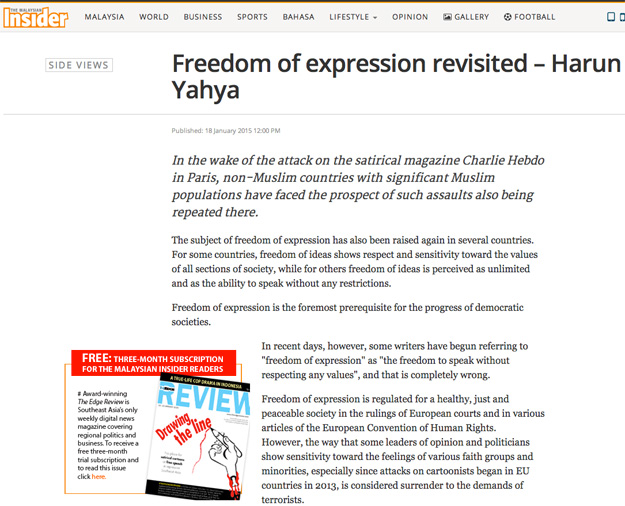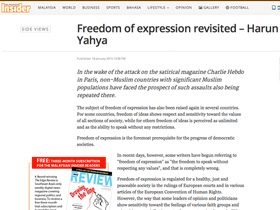
In the wake of the attack on the satirical magazine Charlie Hebdo in Paris, non-Muslim countries with significant Muslim populations have faced the prospect of such assaults also being repeated there.
The subject of freedom of expression has also been raised again in several countries. For some countries, freedom of ideas shows respect and sensitivity toward the values of all sections of society, while for others freedom of ideas is perceived as unlimited and as the ability to speak without any restrictions.
Freedom of expression is the foremost prerequisite for the progress of democratic societies.
In recent days, however, some writers have begun referring to "freedom of expression" as "the freedom to speak without respecting any values", and that is completely wrong.
Freedom of expression is regulated for a healthy, just and peaceable society in the rulings of European courts and in various articles of the European Convention of Human Rights.
However, the way that some leaders of opinion and politicians show sensitivity toward the feelings of various faith groups and minorities, especially since attacks on cartoonists began in EU countries in 2013, is considered surrender to the demands of terrorists.
The fact is that when individual freedoms are set out in the European Convention of Human Rights, the conditions under which such freedoms have to be restricted are also explicitly stated.
Article 10 of the European Convention of Human Rights examines freedom of expression and the conditions limiting it in detail. The first paragraph of Article 10 defines the freedom, while the second explicitly states the conditions under which it is restricted.
Accordingly, freedom of expression is not immune from regulation, and that is essential in the aim of a democratic society. In other words, while the concept of ‘unlimited freedom’ is philosophically tenable, the view undoubtedly has no validity in organised, political societies .
We all want to see societies progress, levels of civilization to rise and more democratic systems; all Muslims who grasp the true aim of Islam will support these ideals. However, defamation of values that people hold sacred and personal attacks are not means by which society can progress.
Pope Francis noted this as well when he said, "You cannot provoke. You cannot insult the faith of others. You cannot make fun of the faith of others. There is a limit."
Indeed, when we set out with the intention of civilizing debates and pass our reactions through that filter, we can see that pictures and talk that will trouble the people around us and drive them away are of no use at all. Treating people with whom we disagree with respect, and even love and affection, are signs of genuine civilization. Otherwise, life in our new global world will become intolerable.
When we compare East and West in terms of freedom of expression, we have to admit that Western states are far ahead.
However, there are still problems even there. The problem with these countries is the lack of stress on objectivity and justice. Let us look at the history of Charlie Hebdo as an example.
Many people will be unaware - or forget - that before Charlie Hebdo came on the scene in 1992, the magazine was called Hara-Kiri and was ultimately fined and closed down by the French authorities. The reason for the closure was again the political caricatures it carried. This means that, while supporting a journal that largely treated the values of religious groups with contempt, French governments prohibited the use of that same language in regard to themselves.
The impression is given in such cases that human rights are only in fact ‘some people’s’ rights.
Let us look at a few examples: Last week a British citizen by the name of Stuart Rodger was sentenced to 100 hours’ community service for shouting at Prime Minister David Cameron during a speech.
Bradley Manning, who leaked secret U.S. files, is still regarded as a terrorist by the US.
If Western circles are honest regarding the question of “no limits” being imposed on freedom of expression, then they should behave the same way when they themselves are criticised.
Nobody, and quite rightly so, will agree to himself and the values he holds sacred being defamed.
As David Brooks said in a piece in the New York Times in the immediate wake of the Charlie Hebdo attacks, titled "I Am Not Charlie Hebdo", almost no publisher in the US would agree to publish cartoons mocking race or religion, and anyone publishing them would most likely find himself unemployed that same week.
Looking at the East, we certainly note that freedom of expression is highly restricted and fully democratic societies fail to emerge because the voice of the opposition has muted. For example, producing an opposition newspaper or writing articles in favour of the opposition in Pakistan can make you a target; the situation is not much different in Saudi Arabia.
Indeed, while the Charlie Hebdo attack was being condemned, a blogger was sentenced to prison and flogging for writing against an item of faith.
In Turkey, opposition writers working for various newspapers close to the government losing their jobs is certainly a factor that weakens the opposition here. This reduces the diversity of content in the press and leads to criticism.
There is therefore a clear need for all societies across the world to adopt a more unifying, supportive, loving and respectful tone and to concentrate on increasing the devotion and brotherhood between us, rather than inciting hatred.
It is here that nonprofit organizations and civil society organizations have a major responsibility. In the same way that a lack of love and education lie behind many of the problems we face today, love and education are at the heart of the solutions to them.
If the articles about freedom of expression in the European Convention on Human Rights can be fully implemented, then the balanced free expression desired in societies can be successfully achieved.
Adnan Oktar's piece on The Malaysian Insider & Urdu Times:
http://www.themalaysianinsider.com/sideviews/article/freedom-of-expression-revisited-harun-yahya



